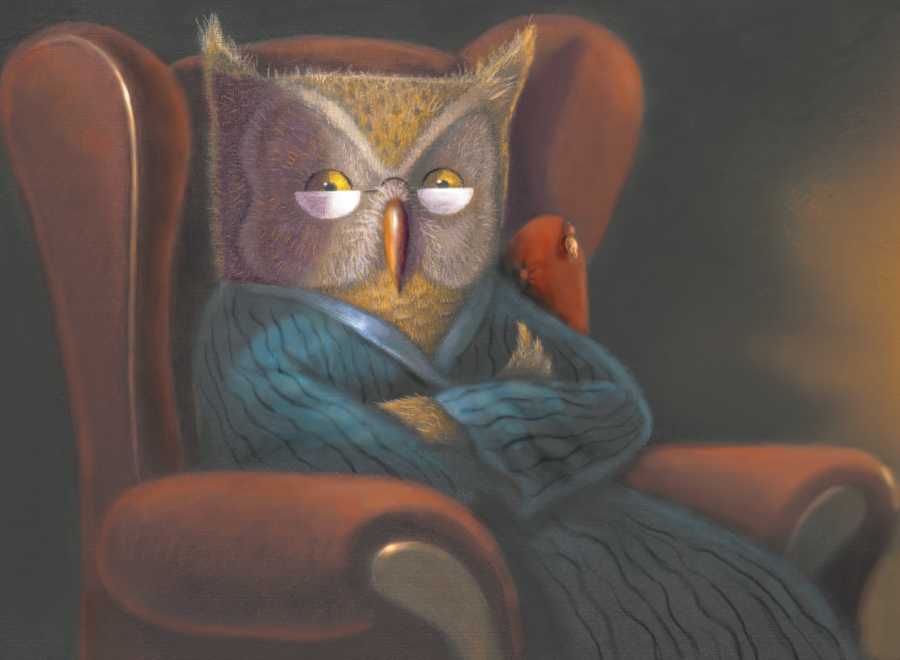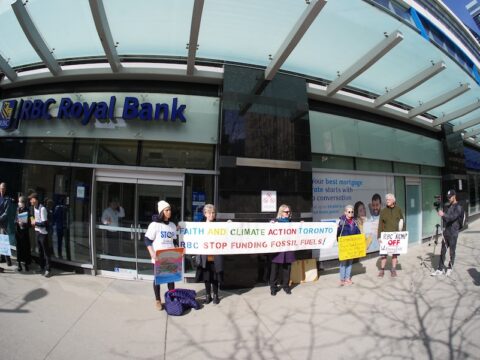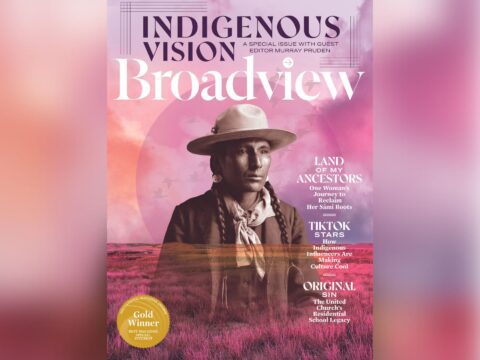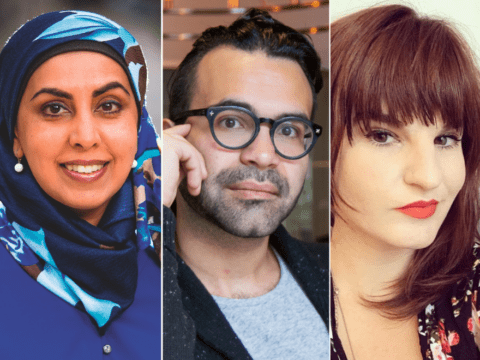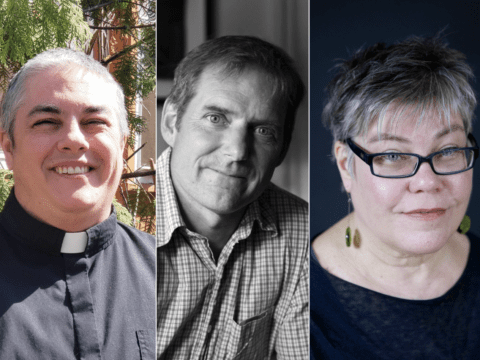My elder for the last 30 years has been Christel Markiewicz. She fled to Canada from Germany after the Second World War and has the hard-won wisdom of the survivor and self-taught scholar. We interpret each other’s dreams, and as an astrologer, she charts my stars, offering advice and the world’s best apple cake.
But the thought that I might become an elder myself never occurred to me until last year. A local parents’ group, trying to prevent the closure of a long-established neighbourhood school, wondered if the Sinclairs would address the school board on their behalf. My husband and I admire the parents’ commitment, particularly the mother who pushes her water-laden wheelbarrow to the playground to sustain the freshly planted trees. So “as elders who have seen the vital role this school plays,” we talked about its value to the neighbourhood.
You may unsubscribe from any of our newsletters at any time.
The meeting was the first time I had given myself that title. “Elder.” I wondered if I was being arrogant. What distinguishes an old busybody from an elder? And what should you do if you are one?
One friend listened patiently to my ruminations about age (I’m 66) and elder status and finally said, “You’re retired. Nobody can fire you. You can say what you want.”
Certainly for Christel, saying what you want is an important task of eldership. “We have to speak out when needed,” she says, “whether it’s politically correct or not.” So at 91, she plumbs the stars and offers advice on everything from controlling impulsivity to avoiding dangerous falls.
Perhaps because I lack her arcane data about individuals, I find it more pressing to say what I want about creation in general. I am discovering that people with relatively little time left on this planet are more acutely aware of its beauty. We are offended at the destruction of a forest or the ruin of a well-loved park for the sake of development. Old people, I am learning, make speeches about traffic and tree cover at City Hall out of that sense of responsibility Christel describes. We are not cantankerous. We are just reflecting what our years and experience declare to be important.
Much of that reflecting is simply remembering out loud. Elders’ memories are especially valuable, I think, as the slow train of climate change chugs closer. Despite the difference in our ages, Christel and I have some experiences in common. The sight of mud-encrusted rubber boots by the back door, for instance, packs a similar physical punch for us both. “I lived on the land and loved the land,” she says. After fleeing Germany, she ended up near Timmins, Ont., married to a dairy farmer. She wore her boots in the barn and the garden, where she grew “wonderful cabbage” for homemade sauerkraut, as well as beets (for borscht) and beans.
Christel and I remember when just about everybody had a vegetable garden, and farms were smaller and more numerous. But the land we love is changing. The climate is uglier, and oil supplies are shrinking. A community’s resilience in the face of such uncertainty may depend on knowledge that many of the older generation retain.
“We can’t simply keep stacking boulders against the change that’s coming on every front,” writes author and activist Bill McKibben in his recent book Eaarth: Making a Life on a Tough New Planet. He argues eloquently that climate change, while irreversible, is not yet a planetary death sentence. But we will need to make tough choices. We will need “to figure out what part of our lives and our ideologies we must abandon so that we can protect the core of our societies and civilizations.”
But what to abandon? The memory of my parents hanging out the laundry makes it easy to let go of my energy-chomping clothes dryer. (At least — I admit — in summer, in a household of two retired adults.) Lugging the basket to the back porch, I remember how my mother, or often my father, precisely pegged the towels and socks onto the clothesline, as if their very orderliness as they flapped in the breeze would lend serenity to all our lives. And later, pulling the clean clothes sun-warmed off the line, I understand how my grandfather’s generation, immersed in the misery of the First World War, imagined they were part of a last grand effort to save civilization. I have the same sense today.
Of course, there’s been no pain to speak of yet. Foregoing the handiness of the dryer, turning the thermostat down a degree or two in winter, and walking to the store hardly qualify as abandoning “part of our lives and our ideologies.” But if McKibben and his ilk are right, harsher realities are coming. Christel offers an elder’s long perspective on discomfort: “Everything made me ready for today,” she says. Some things “were painful, but without them I would not be the person I am.”
To be happy, she insists, you don’t need “all that stuff that’s advertised. Real happiness comes from deeper sources.” She reaches into her own past in a dismembered Europe, on a small island at the mouth of the Oder River. She was exhausted and just a few weeks away from giving birth. “I was sleeping on a dirt floor, with my head on a coil of rope; but I had eaten for the first time in months a proper meal,” she says. It was a moment of simple contentment.
Christel exhibits the kind of broadened, warm affection that is another mark of eldership. Psychoanalyst Erik Erikson said that our late-life task is to negotiate the chasm between self-absorbed “stagnation” and “generativity,” the generous care for succeeding generations. Christel takes a great interest in young people, even if they are not her own friends or children. “I want to know what they want to do, how they want to shape their lives,” she says.
Elders say what needs saying and remember skills the world might need. They have perspective. They encourage the young. That doesn’t sound so different from the role of elder in a First Nations community. But it’s not quite the same. The difference is important.
Aaron Mills is a recent Toronto law school graduate, the inheritor of both Aboriginal and non-Aboriginal traditions. He was nurtured in his younger years by friends and elders at St. Andrew’s United in North Bay, Ont., and — increasingly now — by his indigenous elders. In a phone call from the Couchiching First Nation, he explains that for the Anishinabe, elders “are not just knowledgeable. They are speakers for the community and the culture.”
But a second distinction is more fundamental and complicated. To be an elder in indigenous culture, “age is incidental,” says Mills. “What is crucial is the way you exist in the world; it is the acquisition of a certain quality, a world view. It has to do with the depth with which you understand the connection of all things.” Humans are not “above or other than” other creatures, he says, but are in many ways weaker and more dependent.
That’s a high standard. Although I try, I doubt I am an elder in the fullest sense Mills describes. Nor do I live in a society that comprehends the profound connection between, say, ourselves and those sea creatures, our relations, who are sickened by the oil gushing into the Gulf of Mexico. But maybe we can learn. Maybe McKibben is right. It’s not too late for us to grow up.
The other day, Suzanne Brooks paused on her bicycle while I was weeding in the front yard. She owns a successful bookstore and is also heavily involved in North Bay Grandmothers for Africa, part of the Stephen Lewis Foundation’s Grandmothers to Grandmothers Campaign. Brooks epitomizes the elder’s impatience to simply get on with it, to live a more generative existence. “We have skills and passion,” Brooks says, “and we want to do something else.”
As does Christel, churning out lengthy letters on her computer to a host of younger friends, offering her wisdom even when she is tired and her wrists ache. “You become more aware of the time,” she says. “You want to fill the time with something valuable.”
***
This story first appeared in The United Church Observer’s October 2010 issue with the title “Surprise, you’re an elder.”

